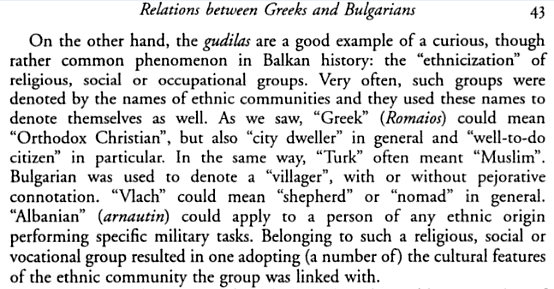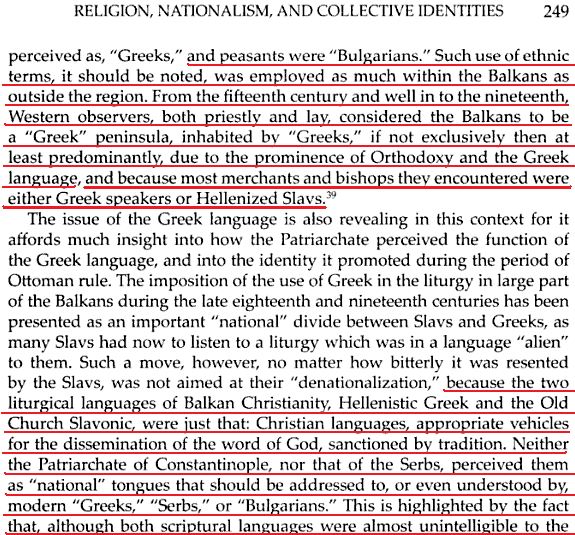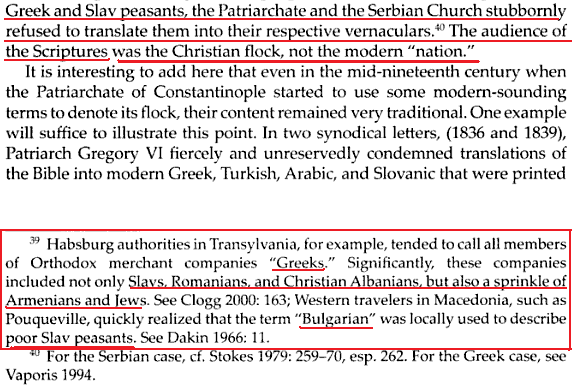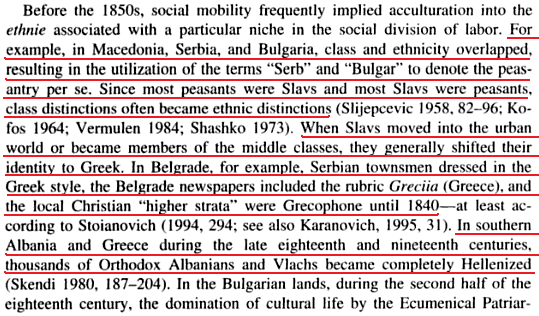What a true, excellent and concise explanation, that is summed up perfectly in less than a minute.
Deconstruction of the term Bulgar/B'lgar/Bugar/Voulgar!
Collapse
X
-
There are others that call them Avars.Contemporaneous sources like Procopius, Agathias and Menander called the Bulgars "Huns" while others, like the Byzantine Patriarch Michael II of Antioch, called them "Scythians" or "Sarmatians", but this latter identification was probably due to the Byzantine tradition of naming peoples geographically. Due to the lack of definitive evidence, a modern scholarship instead uses an ethnogenesis approach in explaining the Bulgars' origin.
I wonder, which sources exactly call these people Bulgars for the first time, particularly in the Balkans?In the name of the blood and the sun, the dagger and the gun, Christ protect this soldier, a lion and a Macedonian.
Comment
-
-
According to Loring Danforth , who is quoted by Mirca Madianou here - http://www.macedoniantruth.org/forum...ead.php?t=1593 on page 30, the terms "Greek" and "Bulgarian" were 'not used to designate different ethnic or national groups, but rather broad socio-cultural categories.'
In otherwords:
"Greek" - Merchant
"Bulgarian" - Peasant or Agriculturalist.Slayer Of The Modern "greek" Myth!!!
Comment
-
-
This topic just keeps getting more and more informative and interesting. Great post SoM.Originally posted by Soldier of Macedon View Posthttp://en.wikipedia.org/wiki/Bulgars
There are others that call them Avars.
I wonder, which sources exactly call these people Bulgars for the first time, particularly in the Balkans?Slayer Of The Modern "greek" Myth!!!
Comment
-
-
No probs TM, the notion that terms such as Bulgar were applied by East Romans to the peasant masses in Thrace and much of the Balkans is strengthened by the above, although I would still like to know who and when reference was made to 'Bulgars' in the Balkans for the first time.In the name of the blood and the sun, the dagger and the gun, Christ protect this soldier, a lion and a Macedonian.
Comment
-
-
Mediating the Nation..., by Mirca Madianou, p.30During the Ottoman period, therefore, terms like 'Greek' or 'Bulgarian' were not used to designate different ethnic or national groups, but rather broad socio-cultural categories (Danforth 1995:59)
Comment
-
-
Macedonians cannot keep up with mythological definitions of ethnicity.Originally posted by TrueMacedonian View Post
Greece and the Balkans By Dēmētrēs Tziovas
How glorious it would be to have so many mythical reasons for calling yourself a given nationality.
Perhaps the new definition for a Macedonian is "someone who does not have fake excuses for a new ethnicity".Risto the Great
MACEDONIA:ANHEDONIA
"Holding my breath for the revolution."
Hey, I wrote a bestseller. Check it out: www.ren-shen.com
Comment
-
-
That summed it up quite well, how the various "ethno-religious" labels were used during the Ottoman empire.Originally posted by TrueMacedonian View Post
Greece and the Balkans By Dēmētrēs Tziovas
The funny thing is, this is coming from an enlightened Greek scholar and not from a Macedonian, which gives this statement even more leverage.Macedonian Truth Organisation
Comment
-
-
Here is another one:
Taken from here.......the legacy of the Ottoman millet system which divided the empire's population according to religious affiliation, leading to a long-lasting correlation between religion and identity.To enquire after the impression behind an idea is the way to remove disputes concerning nature and reality.
Comment
-
-
What strikes me is that the interchangeable use of the term 'Bulgar' in particular its use by Greek speakers, or writers as a kind of class of people.
We know that people of Macedonia had been calling themselves Macedonians, for centuries.
I believe that one wedge or schism, in our culture and our history, happened when this "class" was transformed into a Nationality. At that moment, the Bulgarian nationality had been transferred to include all Slavic speaking peasants, even those who had been calling themselves Macedonians.
This is how our national energies, our literature and culture, had been robbed from us - through a simply play of words, wrong classifications backed by modern institutions.
Comment
-
-


Hellenisms: culture, identity, and ethnicity from antiquity to modernity Edited by Katerina Zacharia and written by Dimitris Livianos.
Interesting to note what Livianos thinks about the church situation. I will be posting more of his work soon. Especially about the Baptised Turk Karamanlis who spoke Turkish and did not speak a word of Romaica.Slayer Of The Modern "greek" Myth!!!
Comment
-
-
That is very interesting read, TM.
Look at this one:
Mizians a Greek nation, lol Thracians, Macedonians all Greeks. Bulgarians are Greeks. lol Istra, Dalmatia all are Greeks.§ 8. Southwards, towards and along the mountains which are called the Alps, are the boundaries of the Baegthware and of the Swaefas already mentioned; and then to the eastwards of the Carendrae country, and beyond the Waste[39], is Pulgara-land or Bulgaria[40]. To the east is Greca-land[41] or Greece; and to the east of the Moroaro or Moravians, is Wisle-land[42]; and to the east of that is Datia, though it formerly belonged to the Gottan[43] or Goths. To the north-east of the Moroara or Moravians, are the Delamensen[44]. East of the Delamensen are the Horithi[45]; and north of the Delamensen are the Surpe[46]; to the west also are the Syssele[47]. To the north of the Horithi is Maegtha-land[48], and north of Maegtha-land is Sermende[49], quite to the Riffin[50], or the Riphean mountains.
-----------------------------------------------------------------------------------------------
§ 10. We shall now speak of Greca-land or Greece, which lies south of the Danube. The Proponditis, or sea called Propontis, is _eastward_ of Constantinople; to the north of that city, an arm of the sea issues from the Euxine, and flows _westwards_; to the _north-west_ the mouths of the Danube empty themselves into the south-east part of the Euxine[64].
To the south and west of these mouths are the Maesi, a Greek nation; to the west are the Traci or Thracians, and to the east the Macedonians. To the south, on the southern arm of the Egean sea, are Athens and Corinth, and to the south-west of Corinth is Achaia, near the Mediterranean. All these countries are inhabited by the Greeks. To the west of Achaia is Dalmatia, along the Mediterranean; and on the north side of that sea, to the north of
Dalmatia, is Bulgaria and Istria. To the south of Istria is the Adriatic, to the west the Alps, and to the north, that desert which is between Carendan[65] and Bulgaria.
Taken from:
A General History and Collection of Voyages
and Travels, Volume I, by Robert Kerr
Kerr, Robert, 1755-1813
The whole Balkan is Greek
A nationalist of Grk would look at this and embrace it as if it is true and will look for Greeks all over the Balkan.
But, if one looks with help of what you posted, than it is only clear what it means.To enquire after the impression behind an idea is the way to remove disputes concerning nature and reality.
Comment
-
-
Here is something interesting, take note of the "Bulgarian" names:
Were the pre-Exarchate Bulgarians Srbomani? Or Grkomani?http://en.wikipedia.org/wiki/Bulgari...my_of_Sciences
As Bulgaria was under Ottoman occupation, Bulgarian émigrés founded the Bulgarian Literary Society on 26 September 1869, in Brăila, the Kingdom of Romania. The first Statutes accepted were:
Board of Trustees
Nikolai Tsenov – President
Vasilaki Mihailidi
Petraki Simov
Kostaki Popovich
Stefan Beron
Acting members:
Marin Drinov (1838-1906) – Chairman
Vasil Drumev (1840-1901) – Member
Vasil D. Stoyanov (1839-1910) – Secretary
The following year, the Literary Society began issuing the Periodical Journal, its official publication, and in 1871 elected its first honorary member - Gavril Krastevich.
Here is something else:
Tsk, tsk, I guess these 'Hellenes' were missed by Bakoyan and Karaman, somebody alert kathireminioglou......http://www.makedonika.org/Bojdimi1.htm
В. Друмев пише: “И взехме ние да се учим на гръцки, да говорим по гръцки, да наричаме себе си гърци. И досега има между нас почитани българи, които се гърчеят, които хортуват... на гръцки, които мразят българите”.
Translation: V. Drumev wrote: And we began to learn Greek, to speak in Greek, to call ourselves Greeks. And even till now there are among us respected Bulgarians, that Greekocise, who (?).....in Greek, who hate the Bulgarians.In the name of the blood and the sun, the dagger and the gun, Christ protect this soldier, a lion and a Macedonian.
Comment
-


Comment